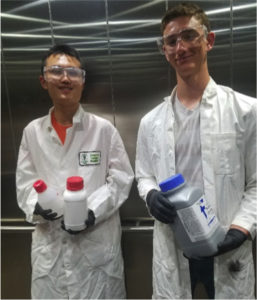This summer, Christopher Snow, assistant professor in the Department of Chemical and Biological Engineering, introduced an eleven-week, high school intern program designed for students interested in exploring the field of chemical and biological engineering. Four interns were selected based on their resume qualifications and interview, and were mentored by current undergraduate and graduate students in Snow’s lab.

“While our lab has annually hosted summer high school interns since 2013, this new program represents the largest, most organized high school summer engagement effort yet,” said Snow. “We’re hoping to continue to offer this opportunity in upcoming years.”
Intern responsibilities vary with the current research activity in the lab each summer. During the past session, students designed their own experiments to compare the quality of protein crystals grown using various methods. Notably, the students tested protocols where the crystals were grown in a gel in an attempt to slow the growth kinetics and prevent structural inconsistencies. A second set of results from the interns pertained to experiments in growing inorganic alum crystals. In both cases, growing biological or inorganic crystals, the interns tested a strategy called seeding. A seed, or small crystal, of alum was suspended in a round flask using wire and a larger crystal grew off of the seed.
“The student interns learn a broad spectrum of skills: the basics of pipetting small volumes (microliters) and making buffers, all the way to the challenging core concepts of X-ray Crystallography. At the end of the summer, most of the students listed their favorite parts of the experience as designing experiments and seeing the Rigaku Home Lab, an X-ray source at CSU,” said chemical and biological engineering graduate student and program organizer, Abby Ward.
In addition to lab activities, the group was supported in their efforts to enter the U.S. Crystal Growing Competition this fall. The students will submit their best quality, largest, and most unique crystal, along with a video sharing their creative comparison of inorganic crystallography to protein crystallography.
For information on next summer’s intern program or to apply, contact Abby Ward.